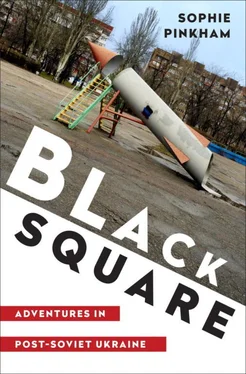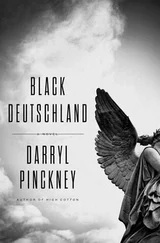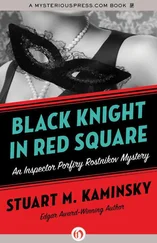“Because I am MSM,” he said. In AIDS lingo, MSM means “man who has sex with men.” It’s an epidemiological term meant to identify a risk behavior without assigning a sexual orientation, since some men have sex with men for strictly pragmatic reasons. I was a little surprised to hear that Vadim was gay, or maybe bisexual. (I assumed he wasn’t doing it for pragmatic reasons.) I didn’t know yet what signs indicated gayness in Russia, a country where every second man was wearing shiny, pointy shoes and carrying a man-purse, an item so ubiquitous that it had a special name, barsetka .
“People don’t usually call themselves MSMs in conversation,” I told him. “They say, ‘I’m gay,’ or ‘I’m bisexual.’”
“I don’t like labels,” Vadim said serenely. A social worker who did HIV prevention work in Moscow, he had learned the language of the international AIDS movement, of epidemiology and “funding streams.” But as people often do when learning a new language, he had made it his own, fitting it to his needs. A Russian “MSM” is faced with terrible options when he wants to find a name for himself. In mainstream discourse, popular choices include variants of the word pederast , including the cruel diminutive pedik ; gomoseksualist , or “homosexual,” shortened to the horrible gomik; goluboi , which literally means “light blue,” less derisive than the others but derisive all the same; and gei , which is not derisive but is ostentatiously foreign. No wonder Vadim took refuge in acronyms.
The entrance of the club could have been the lobby of a shabby administrative building; the dimmed lights didn’t conceal the linoleum floors, and the walls were bare. We followed the music into a basement crowded with dancers and techno. Two small, sturdy men with gelled hair and wicked grins danced in thongs onstage, lip-synching and beckoning others to join them. Men kept hopping up, stripping naked, and comparing the lengths of their penises. I learned the Russian word for “screwdriver” and danced with many Russians, feeling no concern for my personal space.
ALONG WITH THREE OTHER young women, I had been assigned to work at the Red Cross in Irkutsk, in eastern Siberia, near the Mongolian border. (Many Americans have heard of Irkutsk because it was in the board game Risk .) As it turned out, I was the only one in our group who spoke any Russian at all, though one woman, who was about thirty, spoke Czech. She also had professional experience, having worked with crack-addicted sex workers in the Pacific Northwest.
The plane to Irkutsk was very old, with poorly anchored seats that smelled like dirty socks. Most of the male passengers were carrying plastic two-liter bottles of beer. By the time we landed, belches had turned to snores, and we were just in time to see the flat blue snow meet the lavender flush of sunrise. Moscow had been only as cold as New York in winter; Irkutsk felt arctic, like the beginning or end of the world, though it was only early November.
As we waited in the cold for a bus to take us to the terminal, we watched the Russians slip into full-length furs and bulky hats, like shape-shifters assuming their animal forms. They eyed our thigh-length down parkas with a mixture of pity and contempt. Russians can’t stand to see a person underdressed. In this case, however, the sympathy was strictly abstract; we were elbowed aside by two busloads of Russian passengers and left to wait on the tarmac, shivering, for a third bus, on which we were the only passengers.
In the airport terminal we were greeted by Vika, a skinny woman with an angry bruise on the left side of her face, and by Tanya, our interpreter, a cheery, round-faced college student who was visibly excited to meet us. Vika and Tanya shepherded us into a clanking needle exchange van covered in cartoons of grinning, big-headed babies holding syringes. (I guess the babies were supposed to make the syringes seem less threatening.) We drove toward the apartment the Red Cross had rented for us in the center of the city, wondering who’d punched Vika in the face.
Vika told us that she had been robbed and beaten by junkies on her way home the night before.
“But please,” she said, “I ask that you not tell anyone at the office, because I want to tell them myself.” She barked directions at the driver, her brow furrowed.
INITIALLY A REMOTE COLONY, in the nineteenth century Irkutsk became one of the main destinations for exiles. These included political dissidents like the Decembrists, the idealistic noblemen who plotted an unsuccessful revolt against the tsar in December 1825. These homesick cosmopolitans, who were sometimes followed into exile by their wives or sisters, built mansions, theaters, and other reminders of St. Petersburg and Moscow, earning Irkutsk the half-ironic nickname “the Paris of Siberia.” But Irkutsk was also a place of exile for common criminals. Murders occurred daily, and homeowners fired rifles out of their palace windows to scare off the thieves and murderers lurking outside.
By the time we arrived, Irkutsk was still famous for its lowlifes, though the aristocrats were long gone. There were universities and research centers and factories, and quite a lot of foreign students. During the anarchic 1990s, the city had also been saturated with cheap Central Asian heroin, which was, at one point, available in the kiosks where you could buy beer. Heroin was cheaper than cigarettes. There was little knowledge about HIV or drug addiction; the government didn’t provide education or prevention programs. Drug users often shared syringes, and HIV rates skyrocketed.
Our apartment was in the historic center of town, next to a mansion that had been converted into a synagogue and then burned down. (In 1994 an American visitor reported that the synagogue was functioning, but had been defaced by the words YELTSIN = YID.) The neighborhood was full of old log houses with once-colorful fretwork, unevenly repainted. These lopsided buildings didn’t have proper foundations and sank into the earth at every thaw; by the time we arrived, the windowsills were at ground level. Compared to the grim, cement-block Soviet apartment buildings in other neighborhoods, though, they were picturesque.
At our ground-floor apartment, we took turns struggling to open our padded door with its long brass key. This was a ritual that would soon become familiar; in their zeal to prevent break-ins, Soviet door makers made it almost impossible to enter at all.
The apartment seemed huge, with what appeared to be two living rooms. The interior doors were decorated with stained-glass panes showing teapots and Donald Duck, and the wallpaper swarmed with glittering purple flowers. We oohed and ahhed, wanting to show Vika and Tanya that we weren’t your usual spoiled, ungrateful Americans. Then we looked for the three bedrooms we’d been promised. As it turned out, this was a classic bedless Russian apartment, legacy of decades of communal living and chronic housing shortages. Every sofa and chair folded out into a lumpy bed. Our landlady told us that she was relieved to see how small we were; she’d been afraid we’d be too fat to sleep on the foldout chairs.
The next morning Tanya took us to the central market to buy blankets. We walked slowly, gaping at the most glamorous women in the world, with their high cheekbones, long fur coats, fur-lined stiletto boots, and tasseled fur hats. They strutted along the icy sidewalks as if they were on a Milanese catwalk. Like four Buster Keatons, we slipped again and again on the thick layer of ice that covered the unsalted pavement. Tanya helped us up, clucking in concern as the Russian women glided past us, their balance perfect, their effort enormous and invisible.
WE STARTED WITH the Red Cross anniversary party: toasts and speeches (it was disconcerting to watch doctors drinking at lunchtime), love-song-singing, and a strangely hilarious game, based on a fable, in which one of the nurses pretended to be a turnip stuck in the ground and others pretended to be a grandmother, grandfather, girl, cat, dog, and mouse, trying together to pull her out.
Читать дальше












